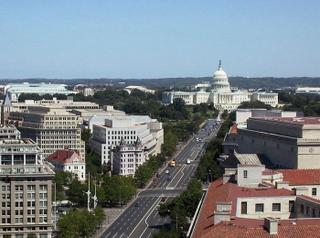
Yesterday was filled with mixed emotions as stories were coming out first about Edith Clement and then at around 7:00 seeing the headlines about John Roberts being chosen. I was kind of disappointed by Edith Clement’s mixed record and her comments on previous court decisions. Glued to the TV and internet for most of the day, I was fairly surprised when Bush chose Roberts contrary to the buzz about it being a woman from the 5th circuit court. After listening to the commentary and perusing the blogs, I am certain that Roberts will be an excellent justice and will follow the Constitution instead of interpreting cases in a more liberal manner. Here are a number of reasons why I am excited about his future tenure on the bench and why he was an excellent choice:
1. Roberts seems to be a strong man of intelligence and integrity and will not waver from his conservative roots. From his previous decisions and litigation it seems clear that he will not follow in the footsteps of Kennedy or Souter. The Bush Administration has much more knowledge than the public does about Roberts through people like Kenneth Starr (who Roberts worked with closely), through privileged government documents that he wrote himself when he was a government lawyer, and of course his private meetings with the individual. Though there is little of a paper trail on Roberts, I feel that we should have confidence in Bush’s assessment and in his previous statements that he would choose someone in the mold of Scalia or Thomas.
2. While the jury is out on whether Roberts would overturn Roe v. Wade, it is fairly clear that he will be a pro-life judge. One positive sign is that he has advocated for President HW Bush against Roe v. Wade. He was a lawyer for the administration and had to argue against the court decision yet this is one good sign. The second positive sign is that he said in his address, "I also want to acknowledge my children, my daughter, Josie, my son, Jack, who remind me every day why it's so important for us to work to preserve the institutions of our democracy". This statement becomes more meaningful when you realize that his children are adopted and gives evidence to his respect for life. One last positive sign is that he is married to the former Executive Vice President of the group Feminists for Life. One possibly negative sign is that during his confirmation hearing for the DC Appeals Court he commented “that Roe v Wade was settled law”. The fact is however that as an appeals court justice, you are required to uphold decisions of the Supreme Court. In making this statement then, he does not say that he agrees with Roe v Wade but simply that he will uphold the decision by law. When you are a Supreme Court justice however, you not only interpret law but make law so who knows whether he agrees with the Roe v Wade precedent or not. I think it is fairly safe to say though that in most cases heard he will air on the side of life.
3. Roberts is extremely confirmable with support from lawyers on both sides of the aisle. A series of quotes an article online illustrate this (http://www.law.com/jsp/article.jsp?id=1108389946956):
E. Barrett Prettyman Jr., a longtime Roberts fan and lifelong Democrat who worked with him for years at Hogan, says that if anyone can be both judicious and predictable, Roberts can. "He respects the Court greatly, and would not ignore precedent," says Prettyman. "But if there's a loophole or a distinguishing factor, he'd find it."
Another person who might otherwise be a critic of Roberts is a longtime friend. Georgetown University Law Center professor Richard Lazarus, an environmental law advocate, was a classmate of Roberts at Harvard Law School and roomed with him when they first came to Washington 25 years ago. "John Roberts and I are very good friends, and I think very highly of him as a person, lawyer and judge," says Lazarus with care. "After that, I have to bow out."
Mark Levin, author of "Men in Black," a new conservative critique of the Supreme Court, sees no conflict and is a fan of Roberts. "In the short period he has been on the court, John Roberts has shown he does not bring a personal agenda to his work. He follows the Constitution, and he is excellent."
Roberts is respected by and gets along with liberal lawyers which proves that he is not ideologically combative, is open-minded, and is respectful. A man who is undoubtedly considerate, writes decisions based on facts instead of ideology, and consistently fair, it will be hard for the Democrats to criticize and attack his character and record. The lack of paper trail and short record on the appeals circuit also plays in to his favor. If the Roberts was an ideologue, had a long record, and was criticized by many inside the Beltway, there would be a long and hard fight with a possible filibuster. However, the cards are clearly in his favor.
I and many others are very thankful that Bush picked a conservative and yet confirmable nominee. This selection for the Supreme Court and his future selections were of upmost importance to me as a voter as well as to much of Bush’s conservative base. After the questionable Iraq War, large increases in government (education, health care), and lowering of environmental standards, I can feel like I still got my moneys worth on my vote (even though I live in WI) due to the excellent appointees he will continue to nominate. I have faith that he will be an excellent judge for decades to come and will provide intelligence, leadership, and originalist ideals to the court. Who knows, maybe we’ll even get Janice Rogers Brown when Rehnquist steps down….won’t those hearings be hilarious….would anarchy occur both on Capital Hill and Bascom Hill…we’ll wait and see.




